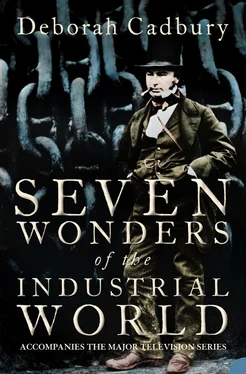1 ...7 8 9 11 12 13 ...18 With Brunel lying paralysed at home in Duke Street, Captain Harrison was now in charge, but his command was diluted as the engine trials took place. The two engine rooms were supervised by the representatives of the firms responsible for the engines; Scott Russell put his man Dixon in charge of the paddle engine room. Brunel had designed many new and innovative features for the smoother running of his ship, some of which those in charge were neither familiar with nor even aware existed. No one had the same intimate understanding of the complex workings of the ship as Brunel and if his familiar figure had been on board, in total charge with his boundless energy and sharp mind directing proceedings, it is possible the accident would never have happened.
The Great Eastern was steaming along, just off Hastings, cutting smoothly through the waves and making light work of the choppy seas that were tossing the smaller boats dangerously around her. Passengers on board had left the glittering chandeliered saloon to dine; a hardier group had gathered in the bow to view the distant land. Suddenly, without warning, there was a deafening roar that seemed to come from deep within the bowels of the ship, and the forward funnel was wrenched up and shot 50 feet in the air, accompanied by a huge cloud of steam under pressure. Up in the air was tossed the forward part of the deck and all the glitter and glory of the saloon in the catastrophic eruption. Passengers were stunned, almost blinded by the white cloud of steam, and then the debris came crashing down.
Captain Harrison seized a rope and lowered himself down through the steam into the wreck of the grand saloon. He found his own little daughter, who by a miracle had escaped unhurt. The accident, it was clear, was in the paddle engine room, which had suddenly been filled with pressurised steam. Several dazed stokers emerged on deck with faltering steps, their faces fixed in intense astonishment, their skins a livid white. ‘No one who had ever seen blown up men before could fail to know that some had only two or three hours to live,’ reported The Times. ‘A man blown up by gunpowder is a mere figure of raw flesh, which seldom moves after the explosion. Not so men who are blown up by steam, who for a few minutes are able to walk about, apparently almost unhurt, though in fact, mortally injured beyond all hope of recovery.’ Since they could walk, at first it was hoped that their injuries were not life threatening. But they had met the full force of the pressurised steam; they had effectively been boiled alive. One man was quite oblivious to the fact that deep holes had been burnt into the flesh of his thighs. A member of the crew went to assist another of the injured and, catching him by the arm, watched the skin peel off like an old glove. Yet another stoker running away from the hell below leapt into the sea, only to meet his death in the blades of the paddle wheel.
‘A number of beds were pulled to pieces for the sake of the soft white wool they contained,’ reported Household Words,
and when the half-boiled bodies of the poor creatures were anointed with oil, they were covered over with this wool and made to lie down. They were nearly all stokers and firemen, whose faces were black with their work, and one man who was brought in had patches of red raw flesh on his dark, agonised face, like dabs of red paint, and the skin of his arms was hanging from his hands like a pair of tattered mittens … As they lay there with their begrimed faces above the coverlets, and their chests covered with the strange woolly coat that had been put upon their wounds, they looked like wild beings of another country whose proper fate it was to labour and suffer differently from us.
Among the crew, the fate of the riveter and his boy, locked alive in the hull years before, resurfaced, with prophesies of worse to come.
The Great Ship sailed confidently on, her engines pounding, not even momentarily stopped in her tracks, just as her designer envisaged. Such an accident would have foundered any other ship. The stunned passengers were at a loss to know what had happened, and were totally unaware that the whole explosive performance could be repeated at any minute with a second funnel. The accident had been caused by a forgotten detail: a stopcock had been inadvertently turned off, allowing a water jacket in the forward funnel to explode under pressure. There was a similar stopcock also affecting a second funnel – also switched off, also building up enormous pressure. By a miracle, one of Scott Russell’s men from the paddle engine room realised what had happened and sent a greaser to open the second stopcock. A great column of steam was released and the danger passed.
Twelve men had been injured; five men were dead. An inquest was held in Weymouth in Dorset. It proved difficult to ascertain just who had responsibility for the stopcock. Scott Russell, smoothly evasive, claimed that he had been on board merely in an advisory capacity and that the paddle engines and all connected with them were the total responsibility of the Great Ship Company. ‘I had nothing whatever directly or indirectly to do,’ he said. ‘I went out of personal interest and invited Dixon as my friend.’ He claimed he had ‘volunteered his assistance only when it became obvious to him that the officers in charge were having difficulty in handling the ship’. All the other witnesses also disclaimed responsibility. There were, however, passengers on the ship who insisted that they had heard Scott Russell ‘give at least a hundred orders from the bridge to the engine room’. The truth, though, was undiscoverable, lost somewhere in the maze of evidence from the variously interested parties. Accidental death was the verdict from the jury.
At his home in Duke Street, Brunel, a shadow but still clinging to life, was waiting patiently through the dull days for word of the sea trials. Paralysed, he lay silently, hoping for good news, hoping so much to hear of her resounding success. Instead, he was told of the huge explosion at sea and the terrible damage to the ship. It was a shock from which he could not recover. It was not the right news for a man with such a fragile hold on life. He died on 15 September, just six days after the explosion on his beloved Great Eastern, still a relatively young man at the age of 53.
The country mourned his loss; the papers eulogised. A familiar brilliant star was suddenly out. ‘In the midst of difficulties of no ordinary kind,’ said the president of the Institution of Civil Engineers, Joseph Locke, ‘and with an ardour rarely equalled, and an application both of body and mind almost beyond the limit of physical endurance in the full pursuit of a great and cherished idea, Brunel was suddenly struck down, before he had accomplished the task which his daring genius had set before him.’
With her creator gone, the Great Ship put in to Weymouth on the south coast for repairs that would bring her up to Board of Trade requirements. While work was in progress, sightseers at 2 s 6 d per head came in their thousands to wonder and whisper if the ship was damned. Was there not a story about a riveter and his boy and bad luck? Since the repairs took longer than expected the company postponed plans for the maiden voyage until the following spring and, as the sightseers had proved financially successful, the Great Ship steamed on to Holyhead in Anglesey, Wales, to find some more.
While there she encountered a fearsome storm with gale force winds and rivers of rain. The crashing waves broke the skylights, deluged the ship and ruined the décor in the grand saloon. Captain Harrison realised she had lost her mooring chains and was at the mercy of the storm. He ordered the engineer to start the paddle engines and, by skilfully keeping her head into the wind, the Great Eastern rode out the storm that saw many wrecked around her. Nearby, the steamship Royal Charter went down with 446 lives, further evidence that the Great Eastern was unsinkable as her creator had claimed. It was decided that Southampton would be a more sheltered port for the winter.
Читать дальше












